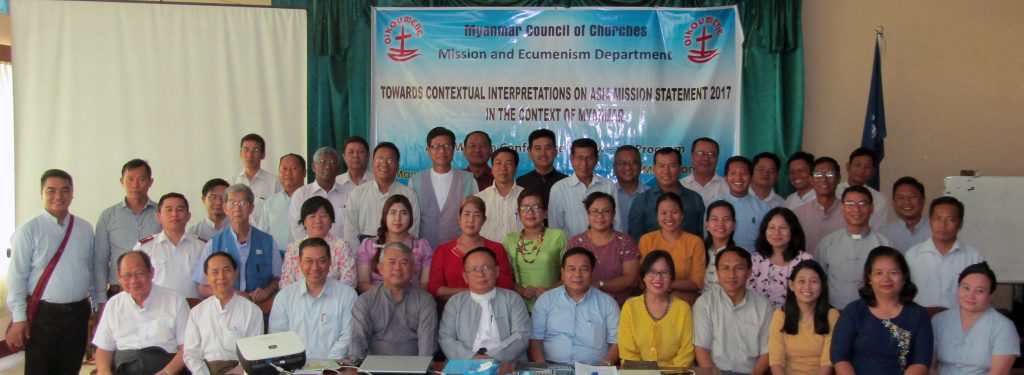Myanmar Churches reflect on contextual interpretation of Asia Mission Statement

A national consultation initiated by the Myanmar Council of Churches (MCC) to reflect on ‘Towards Contextual Interpretations of Asia Mission Statement in the Context of Myanmar’ was held on 1 May 2018 in Yangon, Myanmar.
Organized by the Mission and Ecumenism Department of the MCC, the Yangon Conference was a follow-up of the Asia Mission Conference (AMC) organized by the Christian Conference of Asia (CCA) in October 2017.
More than fifty participants representing 21 denominations of member churches and regional councils of the MCC, as well as representatives from Pentecostal and Evangelical churches attended the Conference.
Rev. Mahn Palmerston, the General Secretary of the MCC, in his opening address emphasized the importance of the Asia Mission Statement in the Myanmar contexts and the need for creative interpretations to be developed by the churches in Myanmar.
Rev. Dr. Ngur Liana of CCA, in a keynote address focused on the contextual theological methods and reflections. He explained the theological, missiological, ecumenical and contextual relevance of the Asia Mission Statement.
The participants affirmed the ways in which the churches in Myanmar would engage in the contextual interpretations of the Asia Mission Statement -2017, and how to take them as theological hermeneutics in Myanmar in order to engage meaningfully in prophetic witness.
Rev. Thawng Ling of the Mara Evangelical Church in Myanmar said, “the areas of mission concerns articulated in the Asia Mission Conference and the Statement are relevant to real situations and realities in Myanmar; it is our duty to contextualize them in our local context”
Rev. Patrick Lain Tonge, of the Anglican Church in Myanmar stated, “Ecological issues are our urgent need in Myanmar and we need to theologize ecological concerns as part of our mission.”
On nurturing interfaith dialogue, Rev. U Myo Chit of the Upper Myanmar Methodist Church, said, “Interfaith dialogue is one of the most important contextual issues in the Myanmar today and missiological relevance of such an issue should be identified”.
Several other participants also affirmed that churches’ theological vision was to reinterpret and contextualize the mission concerns with an aim of going beyond the traditional mission paradigm. Their affirmations also underscored the value to engage in stewardship and kinship as a core thrust of faith; accompany refugees, those internally displaced; treat the excluded and marginalized in a fairly manner; build peace in the midst of conflicts and geo-political turmoil; stand for economic justice; nurture interfaith harmony and religious tolerance for peaceful coexistence in the country, and to be engaged in prophetic witnessing.
Kathy Min Din, Associate General Secretary of the MCC recalled the ongoing ecumenical relations between the MCC and CCA through collaboration, encouragement and mutual support, and she said that “the Asia Mission Conference and the Diamond Jubilee celebration of the CCA held in Myanmar were historic milestones of the Asian ecumenical movement to which Myanmar churches contributed significantly. The time has come now for the churches in Myanmar to reflect further on the mission and witness with an ecumenical commitment”.










